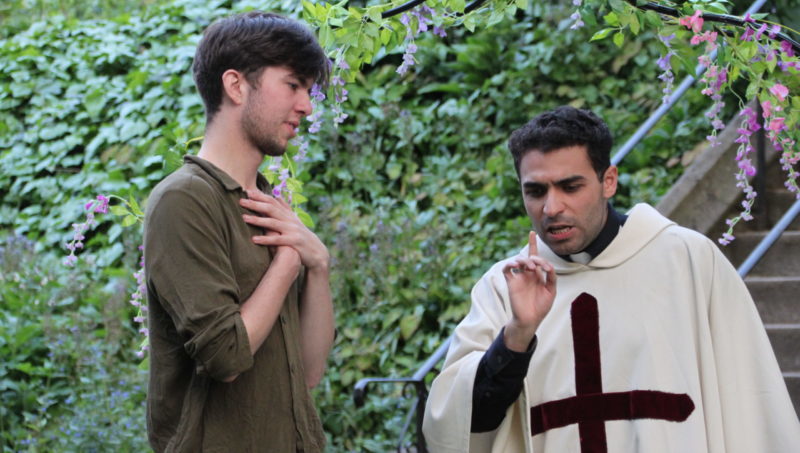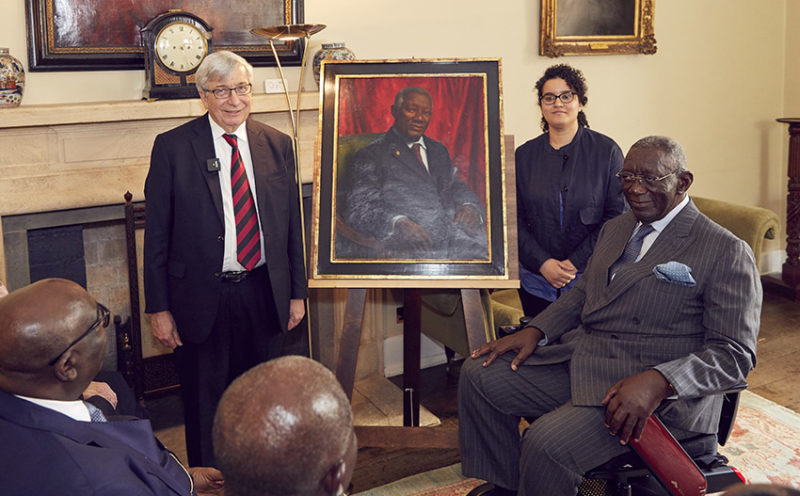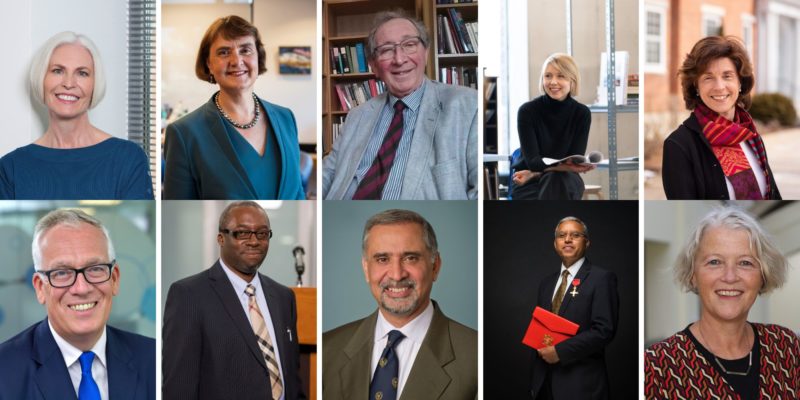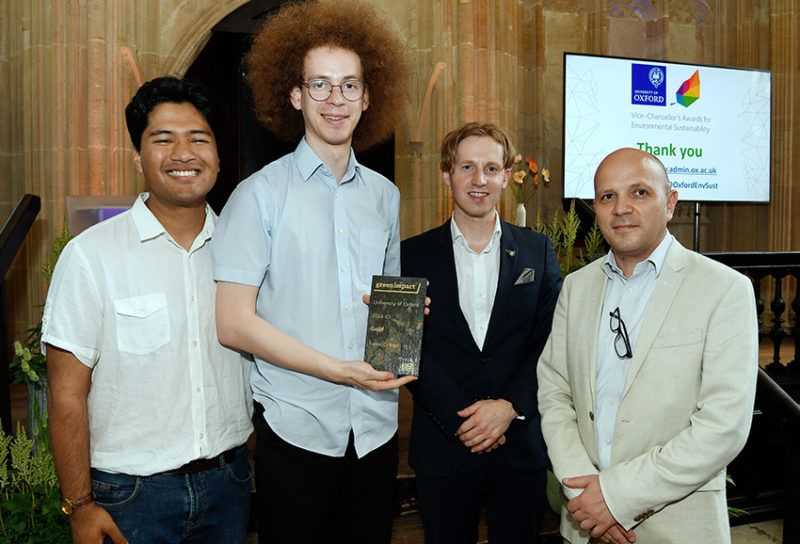Rector Trainor looks back at events of Trinity Term 2023
One of the most characteristic features of Exeter is the great vibrancy of the College community. This vitality was on vivid display during Trinity Term 2023, which featured an extraordinary collection of events and achievements.
To begin with the Coronation, Honorary Fellow Sir Antonio Pappano conducted the preliminary music, while the Coronation service itself included stirring work by that great Exonian Sir Hubert Parry (1867, Law and Modern History). Former Chaplain and Fellow the Reverend Mark Birch (who was recently appointed MVO), Precentor of Westminster Abbey, played an important role in organising his institution’s part in the complex rituals of the day. In College, Sunday’s evensong had a Coronation theme, as did the formal Hall which followed; the latter was garnished with paper crowns and individual flags.
Another notable College event during term involved Exeter’s Visitor, the Bishop of Exeter, the Right Reverend Robert Atwell, who preached at the College’s Commemoration of Benefactors service in early June. Bishop Robert, who retires this autumn, has taken an active and kindly interest in the College throughout his nine years in the role once held by Exeter’s founder. Trinity Term also saw the publication by the College of Exeter in Sixty Objects, a learned volume which is concise, highly readable and richly illustrated. It was edited by Emeritus Fellow John Maddicott FBA, who wrote most of the entries. More sobering reflections on the College’s history came from the report, available on the College website, of Exeter’s Legacies of Slavery Project; it noted that the 18th and 19th century Fellows and students associated with this lamentable system were numerous – as in British institutions generally during the period – albeit only a small percentage of the College community of the time.
Students were very prominent during the term. Some participated in a breakfast at Exeter in early June, for Turl Street Collaboration Group colleges, with almost-new Vice-Chancellor Irene Tracey. She, and they, emerged smiling and animated! For the second year in succession, there was also an Exeter celebration of the Sikh feast of Vaisakhi organised by undergraduate Jasmine Kaur (2021, History & Modern Languages). The annual lunch and Evensong for the parents of undergraduate leavers was well attended, as was the yearly ‘Schools Dinner’ for our visiting students from Williams College. Also lively were the ‘Graduate High Table’ in mid-May and the second annual Middle Common Room end-of-academic-year dinner, which this year included graduate student representatives from Exeter’s sister college, Emmanuel Cambridge. The Master of Emmanuel also attended, and during the dinner he and I signed an agreement updating the collaboration, which began in 1937.
Students were also central to the production, in the Fellows’ Garden and the Chapel, of the humorously lively play ‘The Mandrake’, the first summer term drama held at Exeter for many years. Sport also featured prominently. For example, Exeter’s men’s tennis team reached the semifinals of Cuppers, and three Exeter women played on the University tennis team. In rowing, recent triumphs continued in Summer Eights. The women’s boats were especially successful, perhaps because of the launch of a new women’s boat donated by Emeritus Fellow Raymond Dwek and his wife Sandra. Also, Exeter rowers Ella Stadler (2019, History; 2022, MPhil History of Science, Medicine and Technology) and Vicky Fletcher (2021, English) were elected as presidents of the two University-level women’s rowing clubs. Fittingly, they – and their teammates Jemima Allen (2023, Philosophy) and Harriett Cooper (2021, Engineering) – had a lively conversation with Olympic gold medalist Dame Katherine Grainger during her visit to the College in mid-June.

Students acting in The Mandrake
I can’t resist also noting the annual College Ball at the start of term. Having yielded to requests from Ball organisers that I become a ‘special mystery guest’, I posed as a disc jockey for a ‘set’ toward the end of the event! The improbability of this adventure was my principal asset; fortunately my daughter-in-law and daughter had provided valuable advice on song selection (one per decade). It was one of the most vivid half hours of my life. Despite this intervention, and the usual cool temperatures and rain, the Ball seemed to be a big success.
Children featured largely in College life during the term. The student-run charity ExVac celebrated its fortieth anniversary by running, during the Easter vacation, two holidays for disadvantaged Oxford youngsters. In early May many staff, Fellows, students and their offspring participated in a revival of a pre-pandemic practice: a ‘formal’ meal in Hall for all ages. This event underlined the great importance to Exeter of its staff, who played key roles not only as attendees but also in selecting and serving food appropriate for children as well as adults. In mid-June both staff and students abseiled from the tower over the Lodge in order to raise funds for the local children’s hospice, Helen and Douglas House.
Fellows and Lecturers participated prominently in a variety of more conventionally laudable activities. For example, Michael Bronstein (Artificial Intelligence) won a UKRI Turing AI World Leading Fellowship; Agni Orfanoudaki (Management) received an Early Career teaching award from the Social Sciences Division; and Dame Carol Robinson FRS (Chemistry) was elected to the American Philosophical Society. Meanwhile, Molly Stevens FRS, John Black Professor of Nanoscience, took up a Supernumerary Fellowship at Exeter. In terms of publications, Charles Foster (Law) published Cry of the Wild: Eight Animals Under Siege (Penguin), and Visiting Fellow Farah Karim-Cooper published The Great White Bard: How to Love Shakespeare While Talking About Race (Oneworld). In addition, a number of books were launched at Exeter, notably Nandini Das’s Courting India: England, Mughal India and the Origins of Empire (Bloomsbury), which has already attracted a string of highly favourable reviews.
Finally with regard to Fellows, I note a sad but enlightening occasion: the well-attended memorial service for Professor Paul Snowdon (Tutorial Fellow in Philosophy 1971-2001), who died last August, held in the Chapel on 29 April and ably organised and conducted by the Chaplain, Andrew Allen. I gave a welcome, including excerpts from messages of appreciation received from Exeter alumni whom Paul had taught. Paul’s son spoke movingly about his father’s diverse interests and human attributes. Three philosophy colleagues explained Paul’s distinctive and productive approach to his discipline. The College Choir was, as ever, magnificent.
Alumni loomed large in Exeter’s Trinity Term. In April Yvonne Rainey, Marguerite and I visited New York City, where we held an Exeter dinner and attended the inaugural NYC reception of the Vice-Chancellor. The College’s legacy organisation, the Amelia Jackson Society, visited the Neil Blair Special Collections Room in mid-April and lunched at Cohen Quad. Summer Eights Saturday featured a very well attended garden party, followed by a buffet lunch in Hall, to which all donors living in South-East England were invited. Some of those attending then headed to the College boathouse, and – later – to an especially lively Boat Club Association dinner. A well populated City Drinks occasion followed on 22 June in the congenial setting of the Bow Street Tavern. Two days later came a Gaudy for alumni who had matriculated between 2005 and 2009 inclusive.
Other Trinity Term occasions involving alumni included: a magisterial webinar by alumnus (1958, PPE) & honorary fellow Joseph Nye, former dean of Harvard’s JFK School of Government, on ‘How not to respond to a rising China’; a congenial dinner for Exonians attending the University-wide 120th anniversary reunion of Rhodes Scholars; and the inaugural meeting of the new University-wide Vice Chancellor’s Guild for philanthropists attended by Exonian Charles Outhwaite (1984, Modern History) and his wife Wendy.
Yet perhaps the most spectacular alumni-related occasion of recent months was the joyous inauguration of the photographic portrait (at Cohen Quad), and the unveiling of the oil portrait (which now hangs in Hall), of former Ghanaian President and honorary fellow John Kufuor (1961, PPE). Our alumnus, a democratic statesperson of major domestic and international achievement, was accompanied not only by many members of his family but also of Oxford’s (including Exeter’s) Ghanaian students and of the British-based Ghanaian community. A further very significant presence was that of the King of the Ashanti, who had recently attended the Coronation. Exonian Malcolm McLeod (1965, Social Anthropology), an anthropologist who specialises on West Africa, did much to facilitate the event.

The Rector, artist Naima Aouni, and former Ghanaian President and honorary fellow John Kufuor with the portrait of John Kufuor
In terms of alumni achievements, in recent months Philip Slayton (1965, Jurisprudence) published Antisemitism: An Ancient Hatred in the Age of Identity Politics (Sutherland House), and honorary fellow Richard Celeste (1960, Modern History), former US Ambassador to India, produced his autobiography, In the Heart of It All: An Unvarnished Account of My Life in Public Service (Kent State University Press). During Trinity Term Exeter was very pleased to provide the venue for a dinner celebrating the manifold accomplishments of honorary fellow Timothy Garton Ash (1969, Modern History), Professor of European Studies at Oxford. Another event at Exeter celebrating an Exonian, in this case the great anthropologist Sir Edward Evans-Pritchard (1921, Modern History), was a conference jointly sponsored by Exeter, All Souls and the Royal Anthropological Institute (RAI). Among the themes discussed was the mentorship of ‘EP’ by my predecessor R R Marett (Rector 1928-43), a classicist who pioneered anthropology at Oxford. The conference marked the publication of A Touch of Genius: The Life, Work and Influence of Sir Edward Evans-Pritchard (RAI) edited by André Singer (1966, Anthropology), a distinguished documentary film-maker who was once EP’s research assistant. I would also note that nine Exeter alumni were among the ten honorary fellows recently elected by the College (see the article elsewhere in this edition of E-news).

Exeter College’s new honorary fellows, from left to right: (Top Row) Christina Blacklaws, Carolyn Evans, David Feldman, Polly Findlay (photo by Johan Persson), Maud Mandel, (Bottom Row) Richard Meddings, Kenneth Mwenda, Vikram Nehru, Surya Subedi, Charlotte Watts
A very sad event relating to an Exeter alumnus was the death, on 20 May, of honorary fellow Martin Amis (1968, English). It was announced soon afterward that this celebrated novelist, who much prized his Exeter education, had been knighted just prior to his death.
In terms of College issues, sustainability rightly continued to attract attention. Recent College progress in this vital field attracted a ‘Gold’ rating in the Vice Chancellor’s Sustainability Awards announced in June. The Term also brought recognition of the College’s further progress in diversifying undergraduate admissions: figures released for UK students admitted 2020-22 showed Exeter to be above the ever-higher University average on most measures. Meanwhile, mindful of the need not only to continue ‘bridging’ programmes just before entry but also to encourage the progress of students once they have entered the College, the Governing Body approved a programme of on-course support which will mirror efforts under way in an increasing number of Oxford colleges. Starting with first year students in academic year 2023-24, this programme will use postgraduate student mentors to assist undergraduates, including those aiming at academic excellence, with study skills.

Exeter College Green Impact team members accepting Gold Vice Chancellor’s Sustainability Award
Almost finally, a word on the Library Project. It remains on schedule. The books will be moved back in from early September, and the College Library will reopen to students and other users in time for Freshers’ Week at the start of October. A ceremonial reopening will follow in May 2024, by which time the Fellows’ Garden and the Rector’s Garden will have had time to recover from the disruption caused by the Library’s much-needed restoration and renovation. That interim will also provide an opportunity for further fundraising. Many alumni, and others, have already donated generously to this cause, but more gifts are needed to avoid hindering other pressing Exeter capital projects (e.g. the renovation of the older staircases at Turl Street) in the future. A large number of naming opportunities remain!
Before closing, I wish to acknowledge with enthusiasm the election of my successor, Dr Andrew Roe CB. Naturally I had no role in the selection process other than to meet each of the finalists and (with Marguerite) to show them around the Rector’s flat in the Lodgings. However, Andrew’s current senior higher education leadership role, his breadth of experience in highly demanding jobs, his PhD from my old institution King’s College London, and his very warm personality fill me with confidence about his forthcoming tenure as Rector. But I have a full academic year to serve before I hand over the headship of the College to Andrew on 1 October 2024. So be warned: a vigorous ‘farewell’ programme of visits and events is planned for academic year 2023-24!
Wishing you a pleasant summer – or, below the Equator, a pleasant winter.
Rick Trainor
